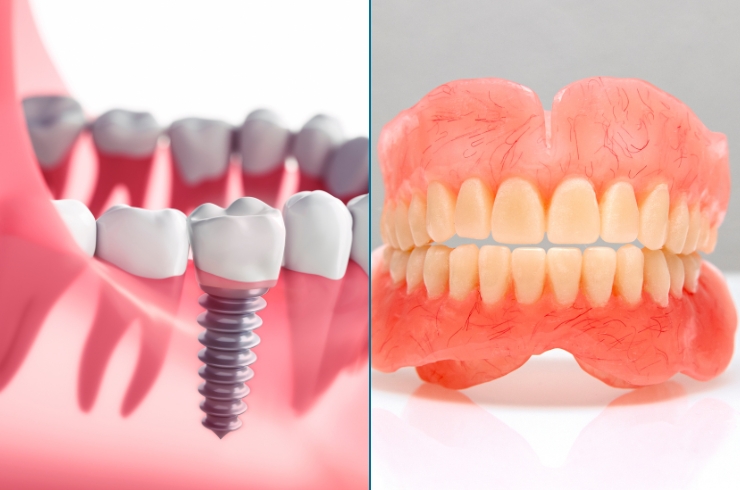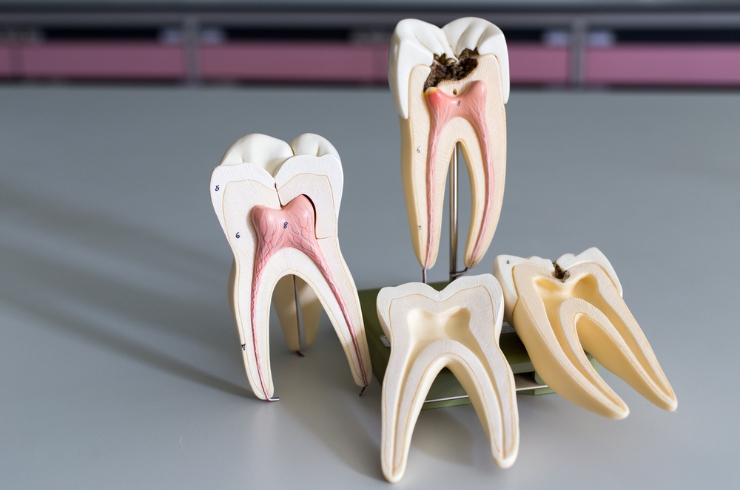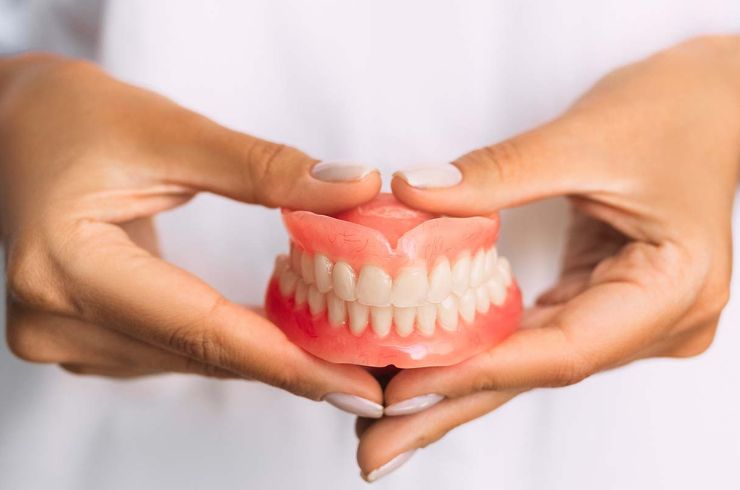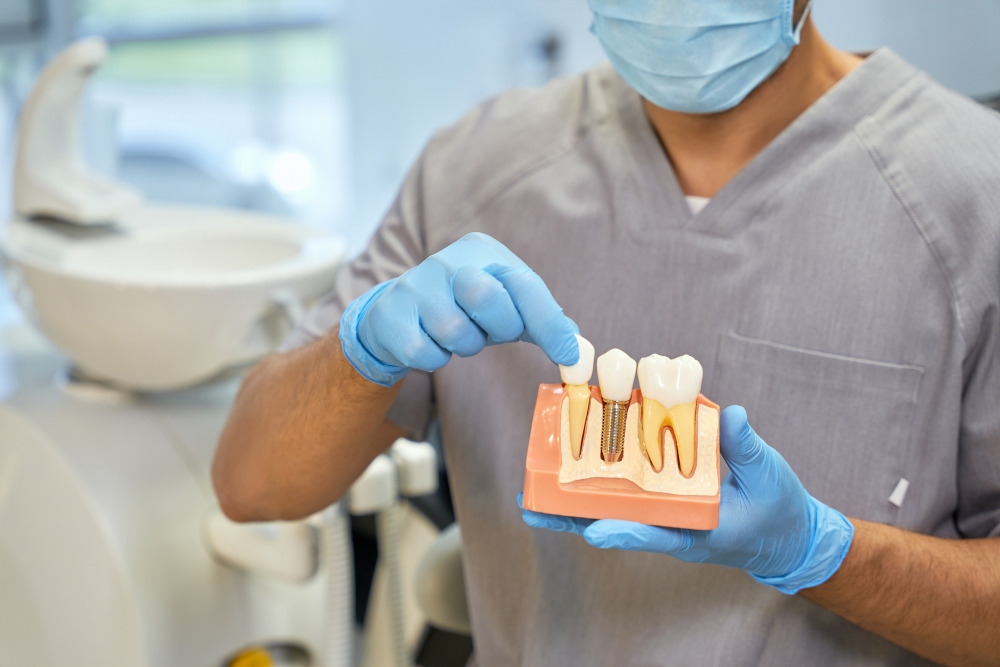(817) 465-3454
Dental Implants vs. Dentures: Weighing the Pros and Cons

When it comes to restoring a missing tooth or a set of teeth, dental implants and dentures are two popular options that can help you regain your smile and confidence. However, choosing between these two options can be a daunting task, as both have their own set of pros and cons. In this blog post, we’ll delve into the details of dental implants and dentures, comparing their advantages and disadvantages to help you make an informed decision about which option is best for you.
Dental Implants
Dental implants are artificial tooth roots that are surgically placed into the jawbone to support a replacement tooth or bridge. They are considered the gold standard for tooth replacement due to their durability and natural appearance.
Pros and Cons of Dental Implants
- Durability: Dental implants are designed to last a lifetime with proper care, making them a long-term solution for missing teeth.
- Natural appearance: Implants look and feel like natural teeth, blending seamlessly with your existing teeth.
- Jawbone preservation: Implants stimulate the jawbone, preventing bone loss and maintaining facial structure.
- Improved oral health: Unlike dentures, which can harbor bacteria, implants don’t require special cleaning and maintenance routines.
- Comfort and stability: Implants are securely anchored in the jawbone, allowing for comfortable eating and speaking.
- Cost: Dental implants can be more expensive than dentures, making them less accessible for some patients.
- Surgical procedure: Implant placement requires surgery, which can be a deterrent for some patients.
- Healing time: It can take several months for the implant to integrate with the jawbone, requiring multiple appointments fully.
Dentures
Dentures are removable appliances that are used to replace missing teeth. They come in two types: partial dentures, which replace a few missing teeth, and full dentures, which replace an entire arch of teeth. There are several types of dentures available, each catering to specific needs and preferences. Complete dentures, also known as full dentures, are used when all teeth are missing and can be either conventional or immediate.
Partial dentures are used when some natural teeth remain and can be made of cast metal or acrylic. Implant-supported dentures are attached to dental implants for increased stability, while overdentures fit over remaining natural teeth or implants. Immediate dentures are placed immediately after tooth extraction, and snap-in dentures attach to dental implants for added stability. Each type of denture has its advantages and disadvantages, so it’s essential to consult with your dentist to determine the most suitable option for you.
Pros and Cons of Dentures
- Affordability: Dentures are typically more affordable than dental implants, making them a budget-friendly option for tooth replacement.
- Non-invasive: Unlike implants, dentures do not require surgery for placement, making them a less invasive option.
- Easy to repair: Dentures can be easily repaired or adjusted if they become damaged or ill-fitting.
- Reversible: Unlike implants, which require irreversible changes to the jawbone, dentures are a reversible treatment option.
- Stability: Dentures can be less stable than implants, particularly lower dentures, which can move around while eating or speaking.
- Maintenance: Dentures require regular cleaning and maintenance to prevent bacteria buildup and maintain their appearance.
- Replacement: Dentures may need to be replaced every 5-7 years, adding to the long-term cost of treatment.
Dental Implants Vs Dentures: Choosing the Right One
When comparing dental implants and dentures, several factors should be considered to make an informed decision about which option is right for you:
- Longevity: Dental implants are a more permanent solution than dentures, as they are designed to last a lifetime with proper care. Dentures, on the other hand, may need to be replaced every 5-7 years due to wear and tear.
- Aesthetics: Dental implants look and feel more like natural teeth compared to dentures. This can sometimes appear artificial, especially if they are not well-fitted or if the gum color does not match the natural gum color.
- Cost: Dental implants are generally more expensive upfront than dentures, but they may be more cost-effective in the long run due to their durability. Dentures, while initially cheaper, may require more frequent replacement and maintenance, which can add up over time.
- Oral health: Dental implants help preserve jawbone density, while dentures do not provide the same level of stimulation to the jawbone. This can lead to bone resorption over time, which can affect the fit and comfort of dentures.
- Comfort and convenience: Dental implants are more stable and comfortable than dentures, which can improve eating and speaking abilities. Dentures can sometimes cause discomfort and may need to be adjusted or relined periodically to ensure a proper fit.
- Maintenance: Dental implants require regular brushing and flossing, just like natural teeth. Dentures require daily cleaning and should be removed at night and soaked in a denture solution to keep them clean and prevent them from drying out.
- Bone health: Dental implants help preserve jawbone density, which can improve overall oral health and prevent changes in facial appearance. Dentures do not provide the same level of stimulation to the jawbone and can lead to bone resorption over time.
Conclusion
Both dental implants and dentures have their own set of pros and cons. Dental implants are the preferred option for many due to their durability, natural appearance, and long-term benefits. However, dentures are a more affordable and less invasive option that can provide satisfactory results for those who are not candidates for implants. Ultimately, the best option for you will depend on your individual needs, budget, and oral health. Consult with your dentist to discuss your options and determine which treatment is right for you.





